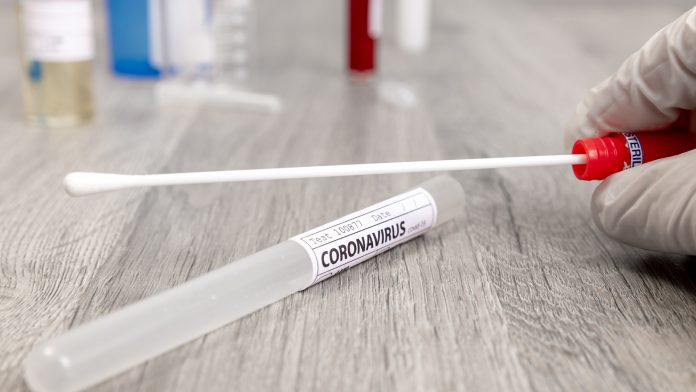
A team of UK scientists has demonstrated that a skin swab test for COVID-19 may provide an effective and non-invasive method for diagnosing the disease.
In the UK, the primary tests for identifying COVID-19 are polymerase chain reaction (PCR) tests and lateral flow device (LFD) tests. However, some people find these tests uncomfortable to perform, as they require the user to swab inside their nose or at the back of their throats.
In a new study performed at the University of Surrey, researchers have identified that a skin swab test for COVID-19 not only provides a non-invasive option for people with suspected COVID infection but also has comparable accuracy to traditional testing.
The results of the study are published in Scientific Reports.
COVID-19 skin swab test
For their study, the team analysed 83 hospitalised patients, some of which were diagnosed with COVID-19. They utilised non-invasive skin swabs to collect sebum from the patients, which is an oil, waxy substance that is produced by the sebaceous glands. The researchers also collected blood and saliva samples for comparison.
Professor Melanie Bailey, the co-author of the study from the University of Surrey, commented: “COVID-19 has shown us that rapid testing is vital in monitoring and identifying new illnesses. In our research, we explored the relationships between different biofluids and what changes in one part of the human body can tell us about the overall health of a patient.
“Our results show that, while blood is the most accurate way of testing for this virus, skin swabs are not too far behind – in fact, the skin swab results were surprisingly accurate.”
COVID-19 has been shown to drastically modify the makeup of lipids of biofluids such as sebum or blood.
Surprising diagnostic accuracy
The researchers analysed changes in lipids and other metabolites of the samples. A score of 1.0 represented the most accurate and sensitive. The blood sample test scored 0.97, the skin swab test scored 0.88, and the saliva test scored 0.80. The results signified the exciting potential of a skin swab test for COVID-19.
Matt S pick, co-author and research student at the University of Surrey, said: “Our research suggests that skin sebum responds to changes to the immune system in Covid-19 patients. In fact, we believe that illness can alter the body’s natural balance across the whole range of biological systems, including skin, digestive health and others. This can help us identify and understand illness better by providing a whole-body atlas of a disease.”
Professor Debra Skene, a co-author of the study and Section Lead of Chronobiology at the University of Surrey, concluded: “The work we demonstrate in this study that profiles metabolites in three different biofluids (serum, saliva and sebum) offers promise in distinguishing people positive for Covid-19 from people negative for Covid-19. The promise of a non-invasive skin swab test for Covid-19 is a reason for much of society to rejoice.”
























